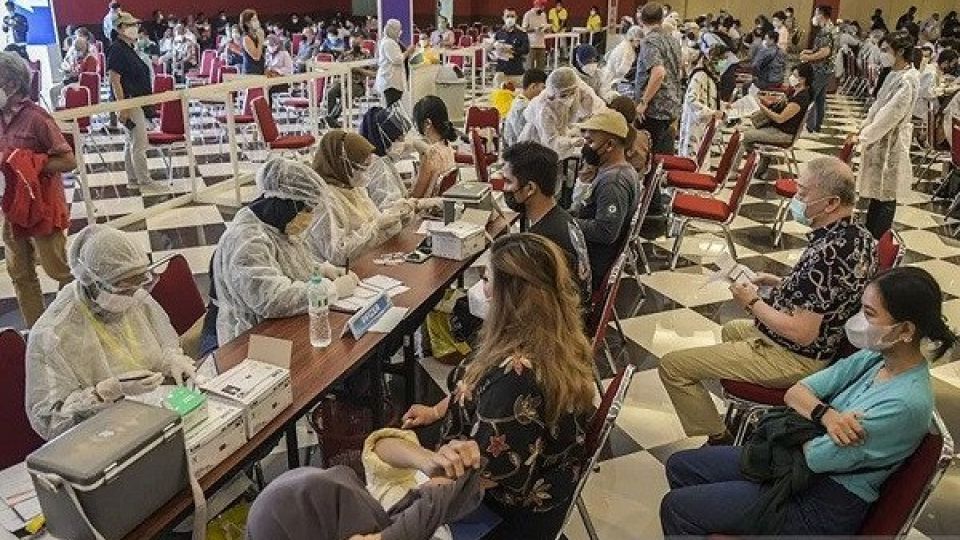June 26, 2023
JAKARTA – The government urges the public to remain cautious against coronavirus and to get booster doses amid the recent lifting of COVID-19 emergency status in Indonesia, saying that the virus is still around and can still infect people.
“The lifting of the emergency status does not mean that the disease has been completely eradicated in the country, it’s just that the risk of contracting the virus has gone down,” national COVID-19 task force spokesman Wiku Adisasmito said in a press briefing on Thursday.
Wiku said the emergency status “could return at any moment” depending on the health, social and environmental situation at the national and global level.
He called on the public to get vaccinated as soon as possible and get booster doses to reach maximum protection against the virus and to maintain herd immunity in the country.
As per Thursday, some 74 percent of Indonesia’s 234,6 million targeted population have received two primary doses of COVID-19 vaccine, but only 38 percent and 1.84 percent have gotten their first and second booster doses respectively.
Despite this, based on the latest serosurvey conducted by the Health Ministry in January, roughly 99 percent of Indonesians have developed antibodies against COVID-19 through a combination of past infection and vaccination.
Wiku also urged the public to practice a healthy lifestyle and maintain personal hygiene such as frequently washing hands, wearing masks if experiencing COVID-19 like symptoms such as stuffy nose, coughing and sneezing, and visiting healthcare facilities as soon as possible when they are ill.
Lifting emergency status
President Joko “Jokowi” Widodo declared an end to the national emergency status of the COVID-19 pandemic on Wednesday, ending weeks of speculation about when the government would formally revoke the emergency status after the World Health Organization (WHO) declared early last month that the disease was no longer a Public Health Emergency of International Concern (PHEIC).
“The government hopes that this decision can spur further [growth] in the national economy and improve the public’s quality of life, social [welfare] and economy,” Jokowi said.
Indonesia has been easing health restrictions starting late last year, with the latest being two weeks ago when the government dropped mask mandates when in crowds, in indoor settings and on public transportation.
Wiku said the decision to lift the emergency status was taken considering the current COVID-19 situation in the country.
“The average daily COVID-19 cases from January to February of this year was 533, a 97 percent decrease from the peak of the Omicron-fueled wave in February of last year,” he said.
The fatality rate has also decreased by 94 percent compared with the peak of the Omicron fueled wave, while the national bed occupancy rate for COVID-19 stood at 1.7 percent, way below during the second wave when the figure stood at 60 percent.
On Tuesday, Indonesia recorded 129 new cases of COVID-19, with 9,480 active cases and 4 deaths.
During the three-year pandemic, COVID-19 has infected 6,8 million Indonesians and killed more than 161,800 people, although experts predict that the real figures are likely much higher.
What’s next
Public health expert Tjandra Yoga Aditama said the government has made the right decision to lift the emergency status of COVID-19 in the country as cases and fatalities continue to decline.
“However, we need to remember that the virus remains. It will continue to infect people, put them in hospitals and take lives, just like any other infectious disease,” he said. “So it’s important for the elderly, people with comorbidity and those who contract COVID-19 to wear masks whenever necessary such as in crowded places.”
He advised the government to continue surveillance and genome sequencing for COVID-19 cases and to increase research about the disease. He also urged the government to prioritize healthcare programs, especially in disease prevention and promotion of a healthy lifestyle.
Epidemiologist Dicky Budiman said the government needed to make clear regulations on COVID-19-related health care entitlements when dealing with the disease as an endemic.
Previously, the government has said that the public will have to start paying for COVID-19 vaccines and treatment on their own or through insurance programs, such as the National Health Insurance (JKN). But Wiku said there was no definite decisions regarding the matter and the government would continue paying for COVID-19 patients’ medical bills and vaccinations until further notice.


